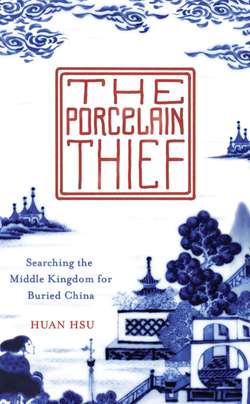The Porcelain Thief

Реклама. ООО «ЛитРес», ИНН: 7719571260.
Оглавление
Huan Hsu. The Porcelain Thief
Copyright
Dedication
AUTHOR’S NOTE
Family Tree
PROLOGUE
[1] THIS IS CHINA
[2] A CHICKEN TALKING WITH A DUCK
[3] LIU FENG SHU
[4] PANDA CHINESE
[5] THE ORPHAN
[6] STREET FIGHT
[7] JOURNEY TO THE WEST
[8] THE REAL CHINA
[9] END OF PARADISE
[10] FROM FAR FORMOSA
[11] CITY ON FIRE
[12] FALLING LEAVES RETURN TO THEIR ROOTS
[13] ALL DEATH IS A HOMECOMING
[14] NANJING
[15] NORTHERN EXPEDITION
[16] A STUMBLE FROM WHICH THERE IS NO RECOVERING
[17] THE NINE RIVERS
[18] THE LONG VALLEY
[19] XINGANG MARKS THE SPOT
[20] CHASING THE MOON FROM THE BOTTOM OF THE SEA
Picture Section
A Note on Sources
Index
Acknowledgments
About the Author
About the Publisher
Отрывок из книги
To my family,
the treasure I always had,
.....
Thank goodness for the knockoff markets, which reliably stocked larger sizes. Though they had been moved underground, literally, they continued to trade in flagrant, sometimes skillful reproductions of designer goods, and my need for clothes that fit justified my momentary disregard for intellectual property. The touts were so adept that they could somehow distinguish among Japanese, Korean, and Taiwanese shoppers and switched the language of their entreaties accordingly. When I walked past one store, the hawker shouted “Shoes!” to me in English.
WHEN I MOVED to China, I knew it would be mean. I expected chaos, overcrowding, pollution, the absence of Western manners and sanitation, inefficiency, and stomach problems. While China was known for rigid control, everything outside the political sphere appeared to be a free-for-all, and daily life in China hardly resembled the regimented totalitarian image that foreigners held. The short—and cynical—explanation was that the government had an unspoken agreement with its citizens: as long as they stayed out of politics, they were free to enjoy the fruits of capitalism and consumerism. Vendors could set up their carts on any public space they saw fit, hawking household goods, fruit, and English-language books, including The Wealth of Nations, Balzac and the Little Chinese Seamstress (a novella about the Cultural Revolution), and 1984, with neither shame nor irony. The city buses careened around their routes at reckless speeds, a holdover from the Mao years, when drivers were paid according to how many circuits they made per hour. There were no means for passengers to notify the driver, yet they made all the right stops and always paused to let sprinting passengers catch up. Everything operated according to unspoken and unwritten rules, and it was no wonder why so many Westerners became seduced by China, because the foundation for all this chaos was exactly what they had been told their whole lives that China lacked: freedom.
.....